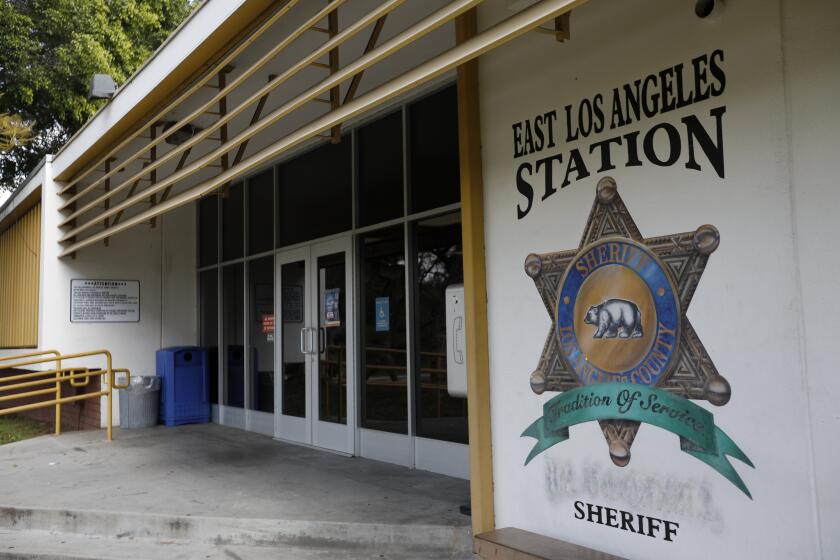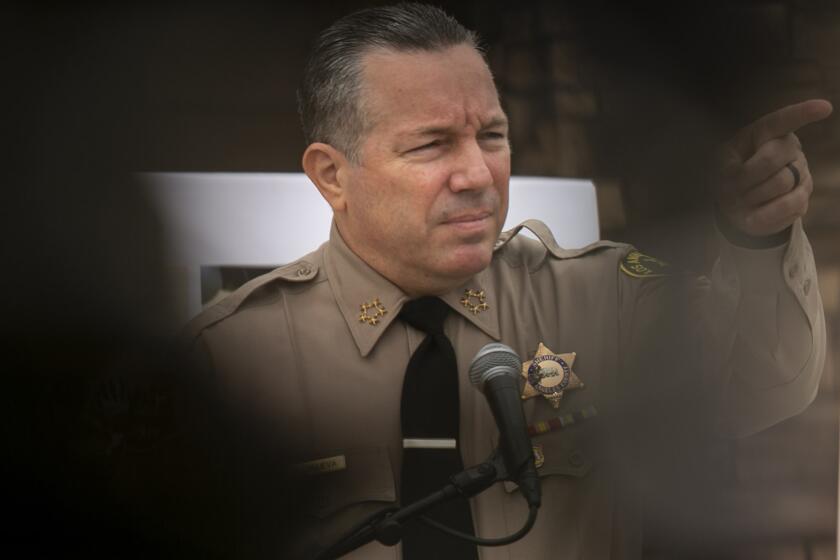Deputy cliques in L.A. County Sheriff’s Department likely growing, study finds

- Share via
Hundreds of Los Angeles County sheriff’s deputies said they have been recruited to join secretive, sometimes gang-like cliques that operate within department stations, according to the findings of a survey by independent researchers.
The anticipated study into the problematic fraternities — which L.A. County officials commissioned the Rand Corp. to conduct in 2019 — found 16% of the 1,608 deputies and supervisors who anonymously answered survey questions had been invited to join a clique, with some invitations having come in the last five years.
All of the roughly 10,000 sworn personnel in the department received a survey, and participation was voluntary. The report also includes interviews with a few dozen sheriff’s and county officials, and 140 community leaders and members of the public.
The study concluded that the groups, which have existed for decades in the Sheriff’s Department and have been criticized for glorifying an aggressive style of policing, are more likely to form at “fast” stations — ones that patrol areas with higher levels of violent crime — and are divisive within the Sheriff’s Department. The researchers did not ask deputies whether they’d ever belonged to a clique.
“Our research suggests that several of these groups were still actively adding members at the time of our interviews,” the report said. The interviews were conducted between November 2019 and September 2020.
More than a third of the deputies surveyed — 37% — said the cliques should be prohibited, including nearly a quarter of those who had been invited to join one.
The Sheriff’s Department has long struggled to clamp down on the groups of tattooed deputies that exhibit what critics have long alleged are the violent, intimidating tactics similar in some ways to those used by criminal street gangs.
Sheriff Alex Villanueva has denied that “gangs” exist within the department but has also taken credit for addressing the problem with a policy that prohibits deputies from joining any group that commits misconduct. Observers have criticized the policy, saying it lacks teeth and is not enforced.
Villanueva did not respond to a request from The Times for comment. In a statement on social media he said that he had not yet read the report but that he looked forward to “seeing how their recommendations can inform the massive reform efforts already underway.”
New court filings in a lawsuit brought by deputies alleging they were harassed by the Banditos deputy gang raise questions about Sheriff Alex Villanueva’s claims about how he handled problems at East L.A. station.
The authors of the Rand study recommended bolstering the policy Villanueva implemented by defining more specifically what is prohibited and by requiring deputies to disclose their membership in organizations.
Sean Kennedy, a member of the Sheriff Civilian Oversight Commission, echoed the report’s point that such early interventions are important because waiting until deputies are accused of misconduct poses too great a risk to residents.
“The problem is joining these groups, in and of itself, is a threat to constitutional policing,” Kennedy said.
The study also recommended that the Sheriff’s Department establish a peer training program to help deputies intervene when they witness misconduct by other deputies.
Inspector General Max Huntsman said Friday that Villanueva appeared this week for an interview after initially resisting a subpoena to answer questions about deputy cliques. The sheriff, however, refused to testify under oath, at his attorney’s instruction, so Huntsman said he declined to question him and now plans to ask a judge to order Villanueva to give sworn testimony.
Lawyers for L.A. County Sheriff Alex Villanueva argued in a court filing that the request for testimony is “too broad” and “harassing.”
Regarding the study, Huntsman said he recommends the “secret societies be banned and investigated.”
Two L.A. County supervisors, Sheila Kuehl and Kathryn Barger, declined through their spokespeople to comment because they hadn’t been fully briefed on the study.
Supervisor Hilda Solis said the findings emphasize how deputy gangs damage the department’s relationship with the community.
“It is unfortunate that due to LASD leadership’s inability and frankly, unwillingness to consistently hold deputies and their respective supervisors accountable, there exists a diminishing relationship between the Department and residents,” Solis said in a statement.
The report is expected to be discussed at a board meeting later this month.
The study found that there was no coordinated effort among supervisors in the sprawling department to discourage deputies from joining this type of organization, with 28% of those surveyed saying that supervisors do not consider the groups to be problematic.
It also found that the purposes of the groups vary. “Some are drinking groups. Others are closer to cliques or, as one respondent called them, ‘popular kids.’ And some encourage a culture of aggressive policing,” the study said.
In interviews, some in the department were critical of deputies “trying too hard” to secure an invitation to join a clique, which the study said could lead to misconduct. For example, deputies might use unnecessary force to show how aggressive they are in hopes of receiving an invitation, the study found. Almost a third of those surveyed said deputies in cliques get special privileges at work.
About a quarter of those surveyed said they believe deputy cliques can be a positive influence by motivating a station’s staff or members of a particular unit, while a similar number felt they can hurt morale and alienate other deputies, the study said. Nearly half of deputies surveyed said the tattooed groups have no effect on a Sheriff’s Department station or a unit’s daily operations.
“The exclusivity and secrecy of subgroups among some deputies in the L.A. Sheriff’s Department poses several risks and challenges to the organization and the communities it serves,” Samuel Peterson, a policy researcher at Rand and lead author of the study, said in a statement.
People interviewed for the study identified several active cliques, including the Banditos in the East L.A. station, the Reapers in the South L.A. station, the Spartans in the Century station, and the Executioners in the Compton station.
The groups often form over shared experiences on the job, the study said. One interviewee said the name of one clique, the Cavemen, came from deputies who worked a lot of overtime and took naps in a dark room in the station basement.
Many people in the community who were interviewed voiced concerns that deputies in subgroups engage in hazing, cover up for fellow deputies, harass community residents and use excessive force.
Los Angeles County has paid out at least $55 million in settlements in cases in which sheriff’s deputies have been alleged to belong to a secret society, records show. The figure comes from a list of cases compiled by county attorneys.
Los Angeles County has paid out roughly $55 million in settlements since 1990 in civil cases involving allegations that sheriff’s deputies belonged to a secret society, records show.
Several cases involving deputies associated with tattooed groups accused of glorifying an aggressive style of policing remain pending. They include one brought by eight deputies who allege they were routinely harassed by the Banditos, a gang of predominantly Latino deputies at the East L.A. station who have matching tattoos of a skeleton outfitted with a sombrero, bandolier and pistol.
Going back to 2016, the lawsuit alleges, the Banditos repeatedly refused to send backup on dangerous calls to the deputies who brought the lawsuit, pressured them to quit or leave the station, and sent hostile messages on work computers. It also alleges that the Banditos once secretly removed ammunition from another deputy’s shotgun.
They recently filed court papers with new allegations that the Banditos had an inking party where 10 deputies were tattooed, raising the number of members to 100.
Vincent Miller, an attorney representing the eight deputies, said the study confirms what his clients have been alleging for almost three years.
“I don’t know what else the county needs to finally acknowledge ... the real depth of the problem and put an end to deputy gangs, finally, once and for all,” he said. “The ranks are growing, not diminishing. This shows what’s been coming out of LASD about addressing the problem is a blatant lie.”
Miller said transferring problematic deputies to different stations, as Villanueva claimed he did in East L.A., does little to solve the problem.
“You don’t spread the cancer around to cure the agency of the disease,” Miller said.
More to Read
Sign up for Essential California
The most important California stories and recommendations in your inbox every morning.
You may occasionally receive promotional content from the Los Angeles Times.














